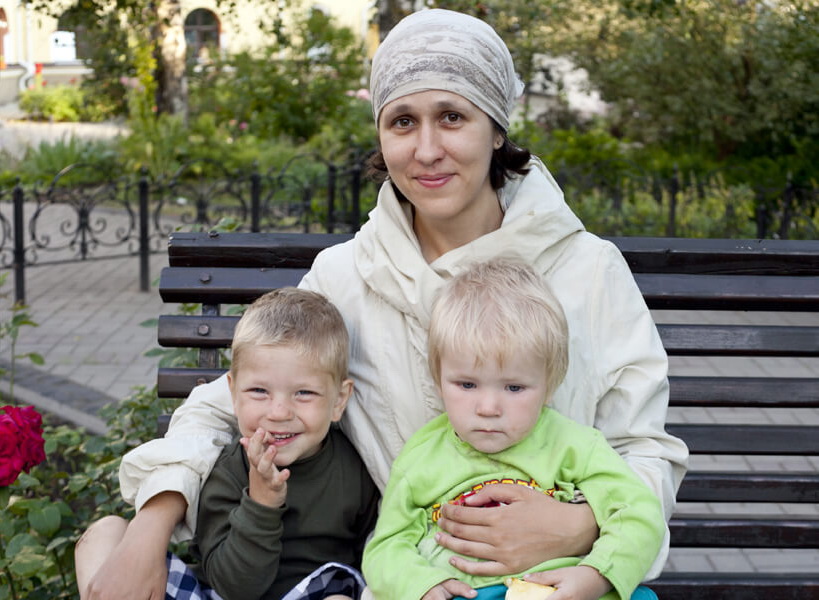
Matushka Larisa with her sons
Doing the paperwork took us until autumn. The process was not very long and was somewhat like getting a driving licence. We completed another training course for would-be adoptive parents and obtained an opinion of a psychologist confirming our readiness for adoption. Then, our living conditions were assessed, and a positive report was issued. The assessment was also more of a formality. We have a small one-room flat, but this was not found to be a barrier to the adoption. An applicant may not have a flat of their own altogether, and rent their apartment or occupy a room in a hall of residence. Adoption is open to families and to single men and women. The only legal limitations that exist are based on the state of health and the criminal record. All of this information is available from the web site of the National Centre for Adoption. We were granted access to the adoption database only after these procedures were complete. Recently, things became even easier for adoptive parents. Information on all the children available for family placement has been centralised and is posted on a portal.
How did we choose our children? Why did we prefer boys? And how did we come to adopt two boys simultaneously?
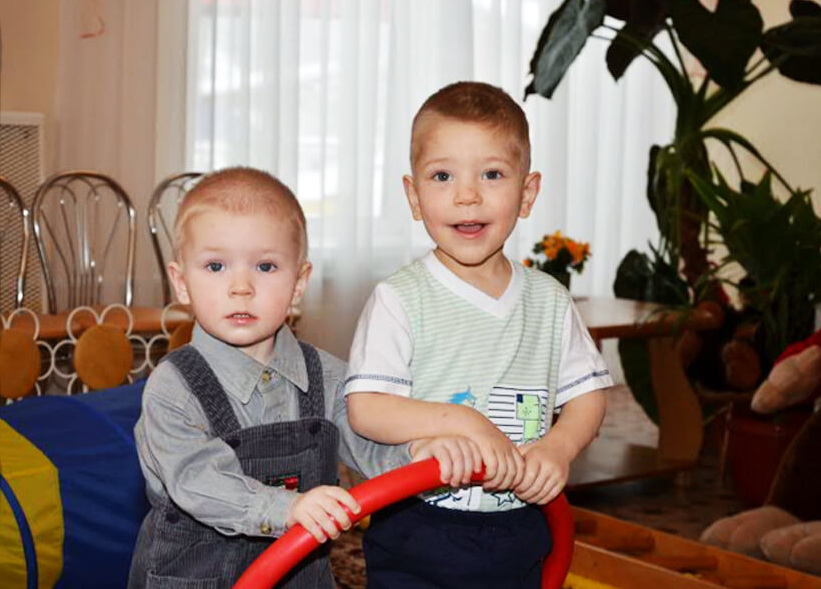
Matvey and Artyom
I would say that our choice was influenced in large part by my discussions with several of our parishioners who grew up in an orphanage and were in the same grade at school. One of them died prematurely in an accident, the other is migrating from one monastic farmstead to another, and has not been able to settle anywhere. The most successful of the three seems to have it all - he goes to church, is married to a good person; they are raising a child and have a flat of their own. However, he is still having a very hard time living the ordinary life of a family man. He was the one who told me about the woes of the children raised in institutions, and how unprepared they were to live independent lives. Orphanages have strict rules against having children work, and these rules are in place for a good cause - prevention of child labour and exploitation, but this prohibition does most of them a bad disservice. They are not even asked to clean up the table after meals, to say nothing of the rest; many honestly do not know where their food comes from. They have no idea that people have to work to earn a living. Indeed, they have many things at their disposal - flows of humanitarian aid coming in, and even summer holidays in Italy. However, all of these benefits end at 16, while many of the children still expect others to continue to provide them. The consequences are not too hard to predict. According to our friend the orphanage alumnus, many of his former classmates are no longer living, some are alcoholics, and others are serving prison terms; only ten of his acquaintances out of 100 are living lives that look more or less like normal.
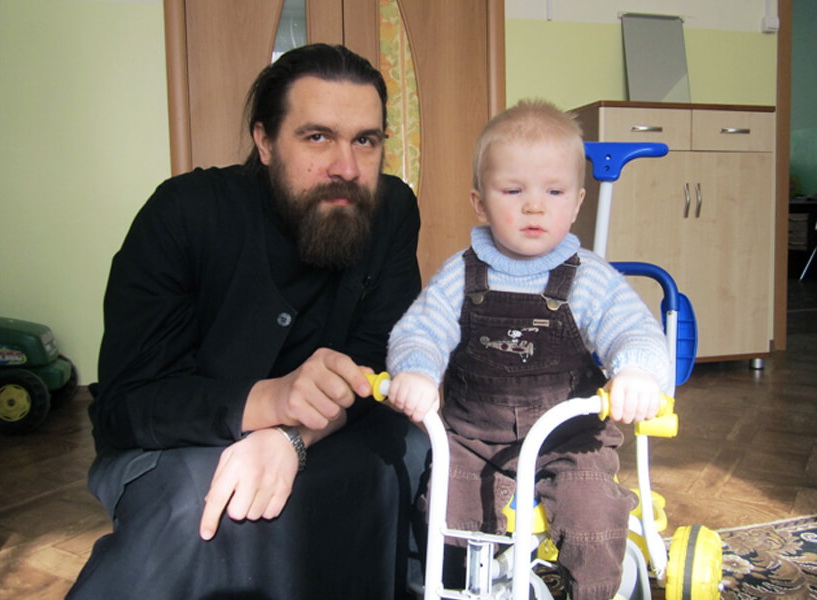
Father Sergius and Matvey
Because I knew some of these boys and was aware of what their lives were like, I was having more pity for boys. I also had the idea that boys are likely to take their cues from their father, and in our family, the father is a superior example to follow. Also, during my training course at the National Adoption Centre, I found out that most families who were willing to adopt were interested in little girls, preferably below one year of age. There is even something of a waiting list for little girls. So this is what I decided: as infants are highly likely to be adopted, I could settle for an older boy, aged one or one and a half years. One adoptive mother I know is raising two children which she adopted at ages three and four. I asked her why she had not taken someone younger than that. She replied: "But what will happen to them? They need parents, too." Today, there are laws that make it difficult too for a mother to abandon her baby in a maternity clinic; she is now obliged to repay to the state the cost of her child's upkeep until age 16, so there are a lot fewer cases of women giving up their children at birth. But even when this happens, a mother is given several months to reconsider her decision, and the baby will not be available for adoption during this period. Simultaneously, there are a growing number of problem families, from which children can be removed at any age. In this respect, the law is a double-edged sword. On the one hand, the state is trying to protect the children from the harmful influence and sometimes physical death; on the other, the only alternative available to these children is often the institution, with perhaps a 90% probability that the child will be traumatised - as children need a family to be normal and to live normal lives. This looks like a vicious circle. Is there a way of breaking it? Can a handful of adoptive parents with big hearts change the world for them? I am not sure. Everyone is doing lip service to helping the biological family of the child before going ahead and removing it. But how can this be done in practice? There are all very tricky questions, and the state and its ways are so impersonal. The President of Belarus proclaimed that all institutions for children would be closed by 2015, but there are still some 5 to 10 thousand orphaned children in institutions. There are some adoptive parents who dedicate their whole lives to helping orphaned children and will raise 20 - 30 of them over several decades. But they are very few, and their capabilities are not commensurate with the need.
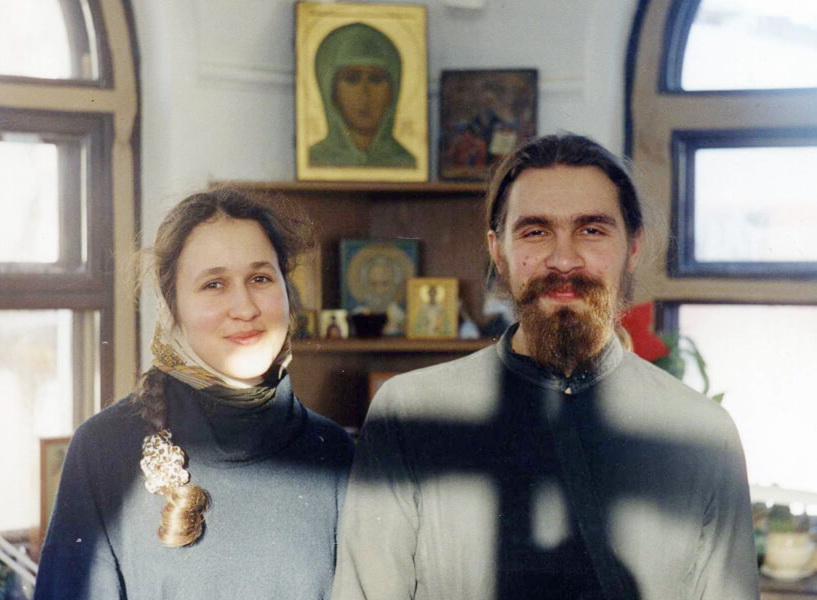
Matushka Larisa and Father Sergius Nezhbort
I also found out during the training where siblings are available for adoption, every effort is made not to separate them, but this makes it more difficult to find them an adoptive family. So I thought to myself: Since someone who grows up with a brother or sister is better off than an only child anyway, why not adopt two boys at the same time? The thought of having to choose a child was also quite disturbing. I could not even imagine myself making the choice. By the time when we had completed the paperwork, there were only two siblings of a young age listed on the database as available for adoption. They were two and three years of age. They showed us their photos and told us the background of the brothers, and my first thought was how different they were from us. Their names - Artyom and Matvey - were very nice, but they did not appeal to us very much, either. There was nothing about the boys that would make our hearts go throbbing or suggest that these were the people we would want to spend the rest of our lives with. The boys were not that young, either. The older one had just turned four, and the younger was going to mark his second birthday. The good news was that neither of the boys was diagnosed with anything serious or chronic, which is quite rare among orphans. We also considered two twins - a girl and a boy aged a year and a half, but they were having health problems, with which I was afraid we would not be able to cope.
On the first day of the Great Lent, we used the space between the morning and evening worship services to travel to another town to meet the children. They were staying at an orphanage outside of Minsk. We met them briefly, our encounter lasted less than a few minutes. The two brothers had been placed in different groups, and barely knew each other. The older boy was highly active (which seemed very disturbing for me at the time). Conversely, his younger brother was his exact opposite - quite sluggish and inert. He looked like a little teddy bear - sluggish, with few emotions and ready to cry for any trivial reason. I can remember him now running around the flat with his leg in plaster chanting "Ta-ta-ta" with a broom in his hand after just a few weeks with us. My husband was watching him, and he was very puzzled. "I wonder what has happened to the quiet boy we took from the orphanage in the beginning," he remarked. I visited the orphanage several more times but could make no sense of what was happening and what I was thinking. I wished to see an omen from above, some kind of clue or indication whether we were on the right track. Adoption is finalised by a court decision. The orphanage director told me that she would not file the papers with the court until we have made up our minds and decided beyond any doubt that we could not imagine our lives without these children any more. I just couldn't. I was still wavering. Some adoptive parents say that they did not have to choose at all - the child just ran up to them and asked if they could call them their mother. However, many experts believe that it is not fair to shift responsibility for the choice towards the child; furthermore, a child who will easily hug a woman and call her mother might behave in the same way towards a stranger, and this is not a good thing. My situation was different. I took the older brother for a walk; he was chanting something in a loud voice. "Why are you crying?" I asked. He said: I am calling my mother. "Where is your mom" "A witch took her away." "Would have me as your mother?" The boy replied decisively: "No way!" I felt upset. "Shall we arrange to meet some other children?" my husband suggested. But I was in no position to sift through the background forms on the children or travel to other cities to meet them. How will I choose? It is much easier with an adult. You can talk, ask questions and see what is on his mind. Even then, you can only know if your initial judgement was current after you have eaten a peck of salt together. Children are completely different. Professional psychologists have told me a number of times that as long as the child does not reject you upfront, it will adjust and learn how to love you without any doubt.
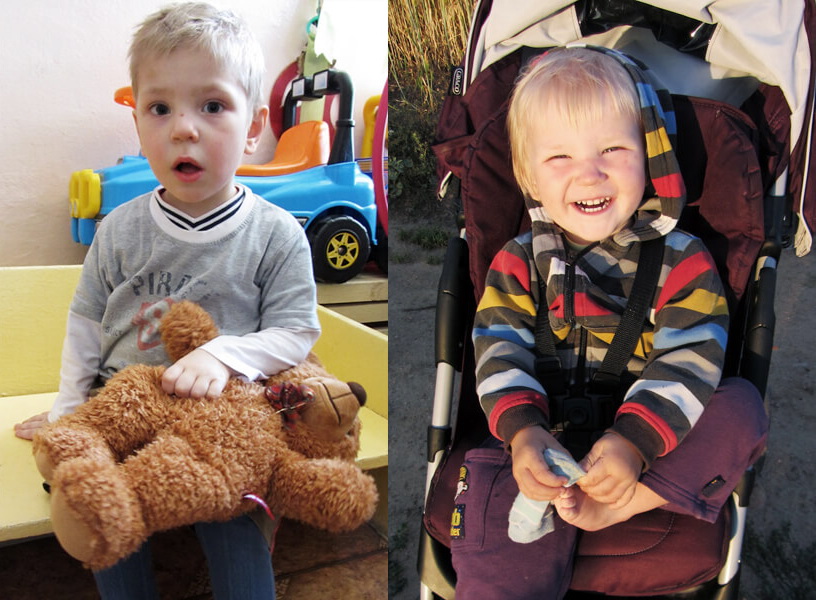
Artyom and Matvey
The orphanage director, who was very complimentary about the children at first, asked me to her office on one of my visits and said: I have nothing negative to say about the younger boy, but I must caution you about the younger one. He has problems and bad habits; he is not likely to perform well at school. She added how much pity she felt for my family and many other things to that effect. But the boy had recognised me on this visit and ran out to meet me, and this outweighed the words of caution from the director. So when she called me to ask if she should go ahead with the transfer of the older boy to an orphanage for older children (aged three years and above), I replied: "No!" But remarks from other people continued to stoke my doubts. On my next visit, the nurses looked at me sympathetically and asked with disbelief: "So you have decided on a boy? Two boys? These ones? Are you serious?" A few days later, the ladies at the National Adoption Centre said: Are you sure you are going to manage? Are you going to have any help? I could not understand their concern. True, I had had no experience with children before, so it did not matter a lot to me if they were going to be boys or girls. With hindsight, knowing what was in store for me in future, I would have looked at my capabilities more realistically. But then there would have been no adoption. On the one hand, having a realistic understanding of one's resources and means is a good thing, but on the other, one has to be a little blind to change one's life. One day, my husband came up to me soon after we married and said: "I had not fully realised the kind of person you are; some kind of blindness must have descended on me from above. Later, he told me several times that one needed to be in this state of blindness in order to marry. Ten years into our marriage, we have finally learned to be on the same wavelength. Hope dies last after all.
To be continued...
By Larisa Nezhbort